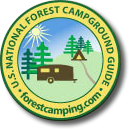In the Kitchen for Novice Campers
This article was first published in 2010 but its tips and suggestions are still current.
You got to eat but, like every other activities associated with camping, meal planning and preparation while camping can seem daunting to the novice camper. The secret is K.I.S.S. (keep it simple silly) and a well stocked kitchen.
One thing about camping you should remember is that for most of us, throughout the day we’ll be busy hiking, fishing, walking, exploring, and doing fun stuff. In other words, when days are full of fun stuff, who wants to spend a lot of time over a hot campfire. However, you’re burning lots of calories and need to refuel you body. What’s to do? Back to K.I.S.S.
I’m an advocate for avoiding over-processed food but this is one time when convenient pre-package food, chips, and chocolate should be included in your diet. Particularly if you are camping at an elevation considerably higher than you body is accustom to. But don’t forget your veggies and fruits.
Tip: Raw fruits and vegetable are outstanding snacks – just peel and eat.
Let me say right now, cooking on an open campfire can be a challenge. Better you use a camp stove for your first few camping adventures. Your camping friends might be sick of my suggesting this but try to borrow, or rent, a camping camp stove until you either buy one for yourself (the has a bunch to tip for buying articles but I think talking with friends and the sales person at your favorite camping stove are the best sources for info) or decide camping isn’t for you. Cooking on a camp stove is like cooking on gas at home but with fewer burners and more wind.
Equipment that I think is really important to have is:
- an ice chest,
- a clean gallon jug for water,
- skillet and saucepan,
- a wood spoon, pancake turner, a sharp knife, and a large fork,
- a roll of aluminum foil, and,
- a kettle.
This is a bare bones kitchen. Plates, glasses, flatware and so on can be disposable but I would recommend taking a few piece of heavy duty plastic with you and wash it and re-use.
Tip: It is better to have something that can do double duty, like a large metal cup for your coffee after you eat your cereal from it, than a sack full of specialty items.
Space will be a premium so claim one end of the campsite’s picnic table as your kitchen. Ice chest on the shady side (which is probably under the table) and stove in the middle of the end. Tip: Having a box of baking soda next to the stove for emergencies, such as an oil fire, is a good idea. I’ve never needed it but you just never know.
One thing most of us don’t realize when we start camping is the effect of elevation on cooking. Everyone has a story about the first time dealing with the challenge of preparing an eatable meal a mile up. Even packaged mac and cheese can be a challenge but, if you remember water boils faster at higher elevations but that doesn’t mean things cook faster, you be okay. Just be patient. It’s all about physics and the fact that while water boils at 212 degrees at sea-level, it will reach a full rolling boil at 196 degrees at 10,000-ft. Tips: Use more water than normal when cooking vegetables, and about anything else, so the pot doesn’t scorch. Besides, you need that extra liquid anyway to ward off the effects altitude on your body.
Tip: Using the aluminum foil for “Packet Meals” is a great way to reduce dish washing but you’ll need a campfire.
A few words about that ice chest – Empty plastic milk bottles are perfect for making ice to go in your ice chest. And you’ll have ice water as it melts – a refreshing delight. A large cardboard box can substitute for a store bought chest. Just pack it tightly in the order what you need and when, wrap it with a heavy blanket, and keep in the deepest, darkest shade you can find. (Be sure to store in your vehicle at night or when away from your campsite.) If you can find a real ice chest, buy block ice rather than cubes or crushed ice. The block ice will melt slower and keep your food stuff cold longer.



Okay, so cooking in a 29 foot fifth wheel trailer isn't as big a challenge as I was thinking! Thanks for the tips. I'll let campers know about it. My husband and I are camp hosting in Morro Bay, California presently as part of an RV adventure. Come visit when you have a few minutes. The Camp Host Housewife http://acamphosthousewifesmeanderings.blogspot.com/
Suzi, You have been by to see the Camp Host Housewife. Thanks for stopping by and sorry about previous comment invite (though of course you are invited by anytime!).